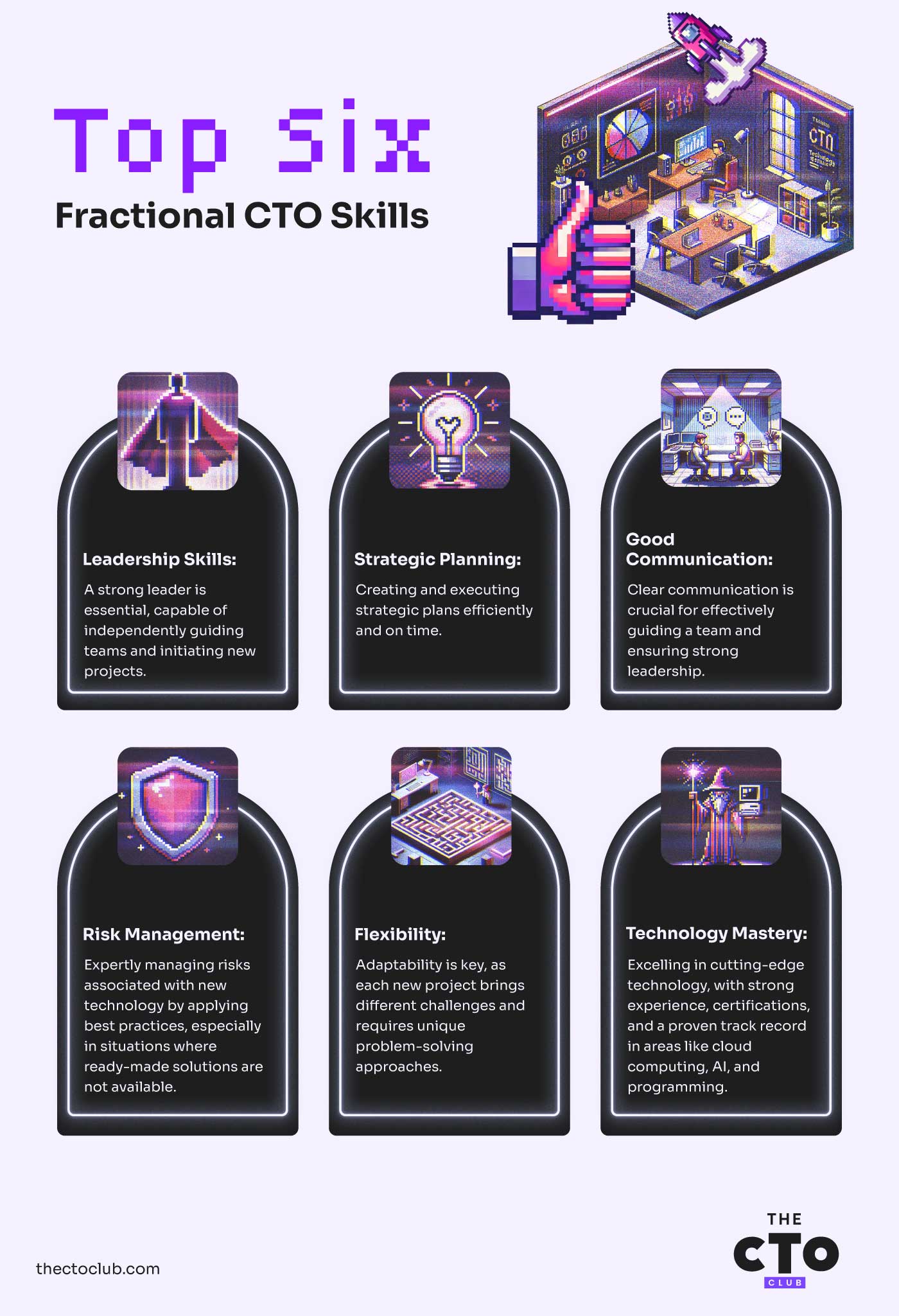What Is a Fractional CTO?
A fractional CTO is a seasoned technology leader who provides strategic guidance to companies on a contract basis, typically for a defined period or specific projects, without the commitment of a full-time executive hire.
This role is particularly beneficial for startups and small to medium-sized businesses that require high-level technical expertise but may not have the resources or need for a full-time CTO.
Fractional CTOs help develop technology roadmaps, oversee major initiatives like cloud migrations, and lead digital transformations, enabling companies to scale efficiently and competitively.
Fractional CTOs are a secret weapon for startups and SMEs aiming to disrupt traditional markets. By leveraging their extensive experience, strategic vision, and ability to implement cutting-edge technologies on a flexible basis, these professionals enable smaller companies to punch well above their weight, challenging established players and innovating at a pace that was previously only possible for organizations with deep pockets and full-time, high-caliber tech leadership.
This trend is democratizing technology leadership, making it accessible to a broader range of businesses and catalyzing a new wave of innovation and market disruption.
Roles and Responsibilities
Fractional CTO services can be done on-site or via remote work, with a full-time commitment over their contract or as a part-time CTO. Typical duties of a fractional CTO include:
- Developing a technology strategy to achieve company objectives
- Hands-on implementation of digital transformations, including direct management of IT operations
- Implementing new product development, especially new software development, and managing vendor relations
- Leading, educating, and mentoring less senior tech leaders in evaluating and implementing new technologies
Top Six Fractional CTO Skills
To get all of this done, a fractional CTO should have years (preferably decades) of experience leading tech teams and getting technically demanding projects off the ground. Skills to look for in someone you're hiring to perform the fractional CTO role include:

- Leadership skills: A CTO, fractional or not, is primarily a leader. Your fractional CTO has to lead teams and innovate new projects independently.
- Strategic planning: This role calls for developing a roadmap and implementing change in a smart, efficient manner. The fractional CTO is primarily responsible for drafting the strategic plan and making it happen on time and within scope specifications.
- Good communication: CTOs talk for a living, and telling others what to do, how to do it, and the reasons for the changes are crucial to effective team building and leadership.
- Risk management: A lot of new technology is risky, and managing that risk takes expertise. A fractional CTO needs to accurately gauge risk and implement industry best practices in an environment that often doesn't have off-the-shelf answers to novel problems.
- Flexibility: A fractional CTO has to be flexible in thinking, planning, and implementing change. This is even more true for the fractional role, as opposed to the permanent CTO position, since every contract brings them to a new company with its own internal logic and approaches to problem-solving.
- Technology mastery: Being a fractional CTO is all about new technologies and innovation. To get ahead in this arena, a typical fractional CTO will have an impressive history of technical training and experience, lots of industry certifications, and a documented record of successful projects involving technology at the edge of the industry. This often includes cloud and edge computing experience, AI and machine learning understanding, and a working knowledge of multiple programming languages and operating environments.
Fractional CTO Qualifications and Requirements
To be considered a good match for most roles, a fractional CTO should have:
- A bachelor's degree or higher in at least one technical subject, such as computer information science, project management, or computer engineering
- Minimum 10 years of experience in software engineering or IT
- Minimum five years in an IT management role, preferably working independently
- A demonstrated record of successful IT management and projects at a variety of companies
Salary Information for 2024
Chief technology officers tend to get paid well. In 2024, the Bureau of Labor Statistics reports that CTOs earn a median pay of $164,070 annually, or $78.88 an hour.
Fractional CTOs usually charge an hourly rate or work on a monthly retainer. Hourly rates can range from $150 to $500. Monthly retainers vary, too, typically falling between $2,000 and $10,000, depending on the engagement level and scope of responsibilities. The rates depend on experience, education, certification, and other relevant factors such as the company’s location and size.
For specific, well-defined projects, Fractional CTOs may agree to a flat fee. This arrangement is particularly common for tasks with clear deliverables and timelines, and the fees vary significantly based on the project’s complexity and duration.
Hiring Process: Tips and Interview Questions
Considering how important the role of a fractional CTO is to your company, it's obvious you have to do your due diligence when hiring one for a major project. Here are some sample interview questions you might want to include in your search. Included is a description of the kind of answer you'll look for in a good candidate.
| Interview Questions | What to Look for in an Answer |
|---|---|
| Describe Your Management Style | Fractional CTOs are, before anything else, leaders. Even at a small company, the CTO will plan and implement a roadmap for new technological developments. Try to evaluate your candidate's approach to forming and leading teams, especially how hands-on or hands-off they describe themselves as. There isn't a single best way to lead a technology team, but make sure your candidate has a style that will work at your company. |
| What is Your Technical Background? | Fractional CTOs are also tech workers, and your candidate should have a solid grounding in most or all of the systems you work with. Any successful CTO will be familiar with Java, Python, C++, C#, etc. It's also good to have a working knowledge of cloud computing, AI, machine learning, and the latest SaaS apps you'll be using on AWS, Google Cloud, and other cloud services. Your candidate doesn't need to give you a detailed rundown on all the technologies they've ever used, but they should convey a decent comfort level with most of them. |
| What Makes You Successful? | Any CTO will be a reasonable success story since the role requires a decent education and years of experience. A fractional CTO works as a freelancer, so they will likely have an easily verified history of success working with other companies. Ask your candidate what their secret is, and listen for the factors they list as critical to their past wins. In particular, listen for signs that they have confidence in their abilities, work easily with team members, and know how to delegate efficiently. If there's anything else you see as a plus in a member of your management team, including outside contacts and the ability to outsource to contractors and vendors, include that in your assessment. |
| Tell Us About a Successful Project You've Led | The previous question covers general principles, while this one asks for specifics. Ideally, your candidate will answer this question with a detailed narrative about a specific project they've led in the past and explain the key points where their leadership made a difference. Listen for mentions of difficulties overcome and ways your candidate effectively coordinated teams to reach business objectives. Ideally, this should be a story you can verify with the prior client, which might be a listed reference that can provide you with a client's perspective on how well the fractional CTO performed. |
| How Do You Like to Communicate With Others? | Almost everything a fractional CTO does requires clear, effective communication at every stage. They should have a demonstrated ability to write memos that others can read, conduct meetings that genuinely resolve emergent issues, and effectively report to the rest of the management team about developments. You're bound to see something valuable about the candidate's talking skills during the interview process, but try to sound them out anyway about what kind of communication they prefer, such as face-to-face or remote meetings. |
Get Cost-Effective With a Fractional CTO
Chief technology officers are key players in keeping your company competitive and up-to-date with the technologies that are changing the way you do business. Fractional CTOs are a cost-effective way for many companies to access those skills at a reasonable price. If you're in the planning stages of a major overhaul or even a minor tweak to how your enterprise uses technology, finding a good fractional CTO to manage the transition is a great option.
For more insight and resources, consider listening to the top CTO podcasts and subscribe to our newsletter for more fractional CTO advice.



